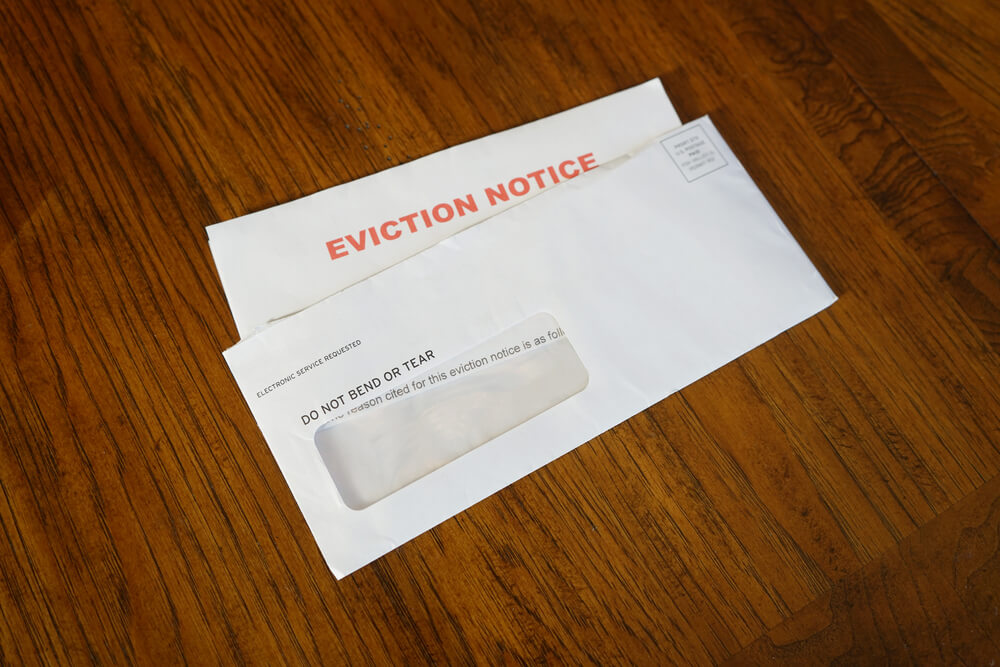No landlord wants to evict a tenant but sometimes the situation is unavoidable. One of the big problems can be that there are some key steps to take and these cannot be done any quicker than the legal time frames. So if you need to enforce an eviction, what kind of time frame should you expect? How long does it take to evict a tenant in the UK?

Reasons to evict a tenant
There are a few reasons to evict a tenant and the reason for the action plays a part in how the eviction takes place.
Sometimes the reason is simply that the tenancy is coming to an end and you don’t want to rent the property any further. This would lead you down one route and will generally be quicker.
The other is where there has been some kind of issue but the tenancy agreement isn’t due to end. Common reasons for eviction include:
- Rent arrears
- Constant late payment of rent
- Breach of contract
- Allowing the property to fall into disrepair or causing damage
- Anti-social behaviour
- Providing false information such as a fabricated credit check to get the tenancy
Sometimes the reason may even be out of both parties hands. Examples include if the landlord is in financial difficulty and the rented property is going to be repossessed. Or the property was provided as part of a job and the tenant no longer has the role.
How long does a tenant eviction take?
The question of how long an eviction takes is a tricky one. As you can see from above, there are various reasons for evicting someone and each has its own requirements and legal stipulations.
However, from our experience, the average is around 6 weeks from the date of the eviction order. Sometimes it may be quicker and there are cases where it can be longer. Some cases can take as long as 6 months if there is a lot of dispute between the parties or other factors. The key to understanding how long the eviction takes is to understand the process that takes place – and how long each element requires.
Free ebook: Landlord’s Guide for Tenant Evictions – Download Now
Tenant eviction process
Let’s look at the general processes in place around an eviction and give some ideas about how long they take to give you some examples.
Serving legal notice (Section 8 or 21)
Every eviction starts with serving a legal notice and there are two that are used in the UK – Section 8 or Section 21. How much notice to give your tenant will vary depending on the individual circumstances of your agreed tenancy.
Section 21 is a ‘notice of possession’ and means you are taking back a property at the end of a tenancy agreement or using an agreed break clause in the contract. There’s no requirement to provide a why for this, simply that you want to do it.
Section 8 is an ‘eviction notice’ and is used when there is a clear ground for eviction. Examples of those include the ones listed above such as not paying rent or anti-social behaviour. You do need to provide a reason for the eviction and the tenant can dispute this which can require a court hearing.
Section 8 and 21 timeframes
You must issue a Section 8 or 21 notice within certain time frames and give a certain period of time, depending on when the tenancy was signed:
- Before March 26th 2020 – 2 months notice
- Between March 26th 2020 and August 28th 2020 – 3 months
- After August 29th 2020 – 6 months
These notices are only valid for six months from the date issued.
You cannot issue a Section 21 notice if the tenancy is within its first four months unless there’s a clause in the contract that allows this.

Court Proceedings
If the date comes on the notice and the tenant hasn’t left the property, then you would need to start court proceedings.
The standard possession claim process would involve completing a Form N5 claim for possession and N119 particulars of claim for possession. This order can also be used under either Section if you want to claim back rent arrears at the same time.
Once you complete the paperwork for court proceedings, a hearing will happen. There are a number of possible outcomes to the case including:
- Dismiss the case and no order will be made
- Adjourn the heating to move to a later date if a decision can’t be made then
- Make an ‘order’ or official legal decision on what should happen
There are then a few orders the judge can issue, depending on the situation. The main one is an ‘order for possession’ which means the tenant must leave by the date provided, usually 14 or 28 days after the court hearing.
You can ask the court to evict them with a ‘warrant for possession if they don’t leave by this date.
Warrant of possessions
A warrant for possession is used if the tenant doesn’t leave by the date stated in the court order or breaks the terms of a suspension order. This is when a bailiff can evict the tenant.
Form N325 is used for this and the warrant number is provided by the court. You then return a form to tell the court the date of the eviction to ensure the process is legal.
You can also get a ‘writ of possession’ to transfer the warrant to the High Court which allows a High Court enforcement officer to enact the eviction.
What if your legal notice is ignored?
When the legal notice is given to the tenant, you should fill in a certificate of service form N215 and add the details of who served the notice and when on the paperwork. If the tenant doesn’t leave by the specified date, then you can use the form to apply for a possession order once the date has passed.
What if your possession order is ignored?
If a possession order is ignored, then the landlord can apply for a bailiff to remove the tenants. This usually involves having a County Court Bailiff enforce it and this can take 4-7 weeks.
Is there a quicker way to evict a tenant?
You can either use the accelerated possession order detailed below to speed up the process. Or if you want to avoid having to wait for a County Court Bailiff, you can apply to have the case transferred to the High Court. Then a High Court Enforcement Officer can handle the eviction for you.
Accelerated Possessions
One way to cut down on the time eviction can take is to use an accelerated possession but this doesn’t apply to every situation.
If you have a Section 21 notice where there is a written tenancy agreement and there are no rent arrears to handle, then you can use the accelerated procedure. This avoids the need for a court hearing but there is still a court fee to pay. You will need to use form N5B claim for possession (accelerated procedure) for this.

Covid-19 effect on tenant evictions
With the current legislation in place to protect tenants during the pandemic, there are a lot more regulations in place around evictions and this can slow down the process.
Another issue is that there are significant delays at court with a backlog of cases so this can take 8-10 weeks to have a case heard.
Is it legal to evict tenants without a court order?
You do need to follow the legal processes to remove a tenant or you could be found to be guilty of illegal eviction. This is where you remove the tenant without a court order, don’t give them the right amount of notice or do something like changing the locks.
I am a landlord, can I evict my tenant myself?
The answer to this is complex but in short, the answer must be ‘No – you can’t evict your tenant yourself, as a landlord’.While there are some parts of the process you can handle yourself, it is definitely necessary to get the right help with other areas. For instance, you can issue a Section 8 or 21 notice yourself.
But once the court order is in place, then a Bailiff or High Court Enforcement Officer needs to be the one carrying out the eviction to ensure it is legal and done correctly. Otherwise, you could be the one in trouble for carrying out an illegal eviction.
You also need to be careful to avoid actions that could be seen as harassing a tenant or trying to physically remove them. That’s why it is best to let professionals handle the eviction for you.
Get the right professional help
Here at Able Investigations, we are experts in tenant evictions and have worked with clients across the country in a wide range of cases. We can act as bailiffs and also have High Court Enforcement Officers on the team to handle a high court order. This means you can be sure the eviction is carried out legally and correctly. We also ensure all required paperwork is completed so you have the paper trail to confirm all processes are complete.
If you need help or advice on commercial or residential tenant eviction services, please contact us today for more information.


Comments are closed.